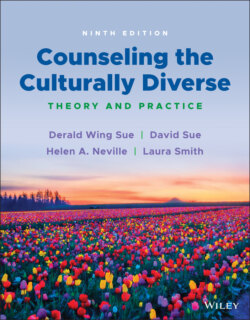Читать книгу Counseling the Culturally Diverse - Laura Smith L. - Страница 62
SOCIAL JUSTICE AND CULTURAL COMPETENCE
ОглавлениеBuilding on the multicultural counseling competencies devised by Sue et al. (1992), the American Counseling Association (ACA) developed Multicultural and Social Justice Counseling Competencies (MSJCC) (Ratts, Singh, Nassar‐McMillan, Butler, & McCullough, 2015). At the heart of the MSJCC is the integration of social justice competencies with multicultural competencies. Acknowledging that multiculturalism leads to social justice initiatives and actions, the MSJCC propose a conceptual framework that includes quadrants (privilege and oppressed statuses), domains (counselor self‐awareness, client worldview, counseling relationships, and counseling and advocacy interventions), and competencies (attitudes and beliefs, knowledge, skills, and action).
Perhaps the most important aspect of the proposed MSJCC is seen in the quadrants category, where they identify four major relationships between counselor and client that directly address matters of power and privilege: (a) a privileged counselor working with an oppressed client, (b) a privileged counselor working with a privileged client, (c) an oppressed counselor working with a privileged client, and (d) an oppressed counselor working with an oppressed client. When applied to racial/ethnic counseling/ therapy, various combinations can occur: (a) a White counselor working with a racial or ethnic minority client, (b) a White counselor working with a White client, (c) a racial or ethnicity minority client working with a White client, and (d) a racial or ethnic minority counselor working with a racial or ethnic minority client. Analysis and research regarding these dyadic combinations have seldom been carried out in the multicultural psychology field. Further, little in the way of addressing counseling work with interracial/interethnic combinations is seen in the literature. We address this topic in Chapter 8. We will also cover the issues raised in the MSJCC framework more thoroughly in Chapters 4 and 5.
It is important to note that the definition and practice of multicultural counseling competence is in a continuing state of evolution and change. Recently, in a series of thought provoking articles, Ridley and colleagues (Ridley, Mollen, Console, & Yin, 2021; Ridley, Sahu, Console, Surya, Tran, Xie, & Yin, 2021) have indicated that multicultural counseling competence is a construct in search of an operational definition. Despite nearly all professional organizations advocating for cultural competency, and despite having them incorporated into ethical guidelines and standards of practice, Ridley & colleagues assert that existing models all possess inherent weaknesses, ambiguities, definitional problems, but most importantly a lack of specific guidelines for how clinicians can translate them into therapeutic practice and effectiveness. We believe that their call to the profession to rethink multicultural counseling competence is a worthy and important one. Although they propose a process model of multicultural counseling competence, it is much too early to judge the merit and practical solutions they propose (Vasndiver, Delgado‐Romero, & Liu, 2021).
